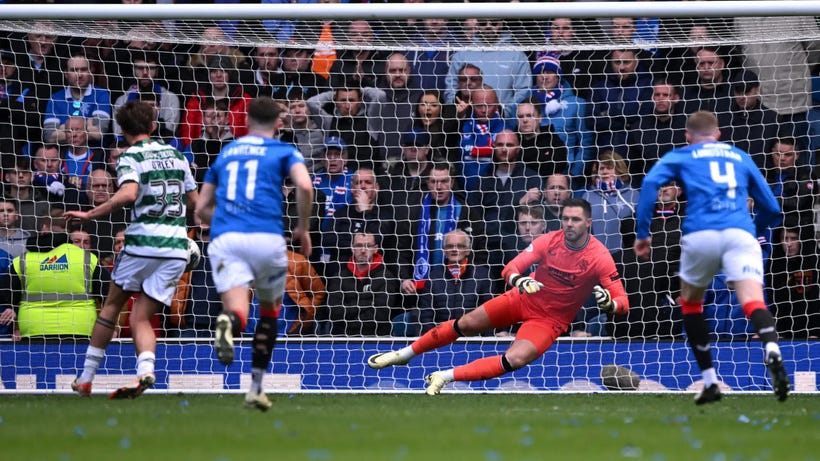By: Lewis Murray
The last two Celtic seasons have seen some of the finest individual performances we’ve seen from our respective players of the year. Matt O’Riley’s final season in the Hoops is perhaps the best individual season from a central midfielder at the club in the last 15 years and Daizen Maeda’s season just gone saw him become the lynchpin of the side, contributing goals, assists and an otherworldly defensive presence.
The question is: which season was better?
Let’s find out, using the highly scientific method of inventing categories of performance off the top of my head and seeing how each season measures up.
First up…
Raw Numbers
Matt O’Riley’s 2023/24 season saw him score 18 goals in 37 league games, as well as one goal in six games in the Scottish Cup and no goals in his one and only League Cup game.
Daizen Maeda scored 16 goals in 34 league games, a stunning seven goals in five Scottish Cup games, and an even more ludicrous six goals in three League Cup games.
For domestic goals, Maeda certainly has the edge - almost as many league goals as O’Riley in three games less and many more goals in the cup competitions, where he was instrumental in winning the League Cup and getting the Hoops to the Scottish Cup final. Of course, O’Riley didn’t have the chance to play more than one League Cup game compared to Maeda’s three, but it’s worth noting as well that one of O’Riley’s league goals was a penalty - none of Daizen’s were.
Maeda has the advantage again when it comes to goals in Europe. O’Riley failed to score in his six Champions League appearances, whereas Maeda score four times in his nine games in Europe.
Now I know what you’ll be thinking here: Maeda’s a forward, O’Riley a midfielder, so this isn’t a fair comparison, but of course we’ll look at more than just goal totals.
O’Riley gathered 18 assists in the league, as well as two in the Scottish Cup. He also managed an impressive three assists in the Champions League, including two very similar assists for Kyogo to score.
Maeda picked up 10 league assists last season, along with one in the League Cup and one in the Champions League.
Put together, their goal contributions look like this.
O’Riley in domestic competitions: 19 goals, 15 assists - 34 total
O’Riley in European competition: 0 goals, 3 assists - 3 total
Maeda in domestic competitions: 29 goals, 11 assists - 40 total
Maeda in European competition: 4 goals, 1 assist - 5 total
Maeda comes out the clear winner from a pure numbers perspective, but the fact it’s at all close is very interesting indeed.
Winner: Daizen Maeda
Derbies
Not at all domestic games are made equal. Some matter more, no matter what way you slice it, and the toughest and most important games are the Glasgow Derbies.
As a result, I don’t think we can appraise these two players’ seasons without paying attention to how they performed in those games.
O’Riley’s first derby of the season saw him assist Kyogo’s winner, although it wasn’t exactly a classic pass - he simply headed Connor Goldson’s own header back where it came. It’s hard to tell whether this was just instinct or if he really believed he was putting it through for Kyogo to run onto, but we’ll give him the credit all the same.
The New Year derby saw him once again assist Kyogo in a partnership that was outstanding all season. This is a better assist, a really nice pass through midfield onto the striker, but, again, I’m not sure how much credit you can give him for what happened next as Kyogo planted the ball in the roof of Jack Butland’s net from well outside the box.
After that, O’Riley really came into his own. At Ibrox he was possibly the best player on the pitch in the madcap 3-3 draw, running the show in midfield and burying a beautiful panenka penalty to make it 2-0 to Celtic.
He was similarly brilliant in the final league derby, constantly popping up in dangerous areas before slotting home a lovely near post finish for 1-0, although he then missed a penalty in the second half and didn’t contribute a huge amount in the cup final later in the month.
All told, O’Riley managed two goals and two assists in five derbies, and was one of the outstanding players in at least two of those games. A very nice return.
Maeda won player of the year in a season in which Celtic were rather less successful in derby games, but he still made his mark.
The Japanese forward scored Celtic’s first derby goal of the season, once again tormenting James Tavernier by running across him to get on the end of Alistair Johnston’s low cross to score. Later in the game he made a trademark Daizen move, sprinting from the left wing to the right to rob Ross McCausland of the ball and lay it off to Callum McGregor, who then stepped forward and unleashed a stunning - if slightly deflected strike - to make it 3-0 for the Hoops. The assist itself may have only been a lay-off, but the run to win the ball was classic Maeda and it paid off perfectly.
The League Cup final in December will perhaps be remembered as Daizen Maeda’s greatest day. With the game poised at 1-1 on the hour mark, he chased down a loose Rangers pass to knock the ball forward and into the air. He ran after it, taking a touch to control it, before slotting it under Butland to score. It’s a truly excellent goal, one that is uniquely Daizen in nature, and it proved crucial in a game that eventually went to penalties.
Maeda did get dribbled past by Václav Černý for Rangers’ late equaliser, but in scoring the winning penalty in the shootout, Maeda wrote his name into Celtic folklore.
The next game, at Ibrox, was as big a comedown from that as you can imagine, failing to make any impact at all in a 3-0 defeat. He was much better in the 3-2 defeat that followed at Celtic Park, scoring the goal that started Celtic’s ill-fated comeback and causing Rangers problems with his runs in the second half, but it wasn’t the commanding derby performance we’ve got used to from Maeda.
He was instrumental in the creation of Celtic’s equaliser at Ibrox in May, running in behind onto a long pass before forcing a fortunate ricochet that fell to Adam Idah. However, he unfortunately spurned an absolutely golden chance to win the game for the Hoops in the final seconds of the game.
Maeda finished the season with two goals and one assist (I’m not giving him the Idah one) against Rangers, slightly less than O’Riley managed - although one of O’Riley’s goals was a penalty, and Daizen did also add a special penalty of his own in a shootout.
So, who comes out on top? The highs are certainly highest for Maeda - his cup final performance will be talked about for years to come - but I think O’Riley’s dominant consistency takes it. Every one of his goals and assists earned Celtic a crucial goal and his all round play was hugely dependable.
Winner: Matt O’Riley
Europe
It was almost certainly performances in the Champions League that earned Matt O’Riley his move to Brighton. The first game against Feyenoord was forgettable, but he followed that up with an assist for Kyogo against Lazio and another against Atlético Madrid, a game in which he looked completely at home at Champions League level. I maintain it is
one of the best all round performances from a Celtic midfielder in the last decade or so, and it’s no wonder that Atlético bid for him in the January window that followed.
The next two games were largely forgettable for O’Riley and Celtic, but he was back to his best against Feyenoord in the final group game, assisting Gustaf Lagerbielke’s late winner.
Daizen Maeda had the chance to play three more Champions League games than O’Riley did - it would have been four were it not for his suspension for a red card picked up late on against Young Boys.
He made an impact throughout the campaign, scoring against Slovan Bratislava and away in Dortmund (the only bright spot in an otherwise dreadful game), before putting in a shift at Atalanta.
Throughout the campaign he was notable for his defensive performances as much as his attacking ones, including in a brilliant win over RB Leipzig. He scored an outstanding equaliser against Club Brugge and made a huge difference when moved to centre forward against Bayern Munich, scoring in the first leg and setting up Nicolas Kühn for another in the second leg.
Both players had some forgettable games in their Champions League campaigns but each provided big impacts at important times too. This may be the hardest category to decide, but I think I’ll hand it to Maeda - he was frequently Celtic’s most important player and was key in Celtic almost taking Bayern to extra time in the knockout round.
Winner: Daizen Maeda
X Factors
It’s one thing to compare stats and performances for two individual players who play different positions in different teams at different times, but there’s always more to it than that - layers of context, of factors that go beyond them.
First up, O’Riley. I mentioned it earlier, but for a central midfielder to come even close to Maeda - a winger and striker’s - goal and assist numbers is quite something. O’Riley was one of Celtic’s best pressers, clever and calculated in his approach to denying opposing teams space and time. He was constantly involved in the team’s best moves. Yet he still found the time to consistently deliver goals and assists when it mattered, regardless of opposition.
What makes it all the more impressive is that, for large stretches of the season, he was essentially doing it alone. The 2023/24 season saw Cameron Carter-Vickers, Daizen Maeda and Reo Hatate all miss significant time with injuries. Callum McGregor and Greg Taylor both had spells on the sidelines too.
O’Riley, however, was ever-present, and in a squad that was criminally short on depth and quality, Celtic relied heavily on him to carry the team through games at times.
To still put together the season he did in those circumstances was really quite remarkable, and it’s no wonder Brighton saw the potential that was worth spending the guts of £30m on.
Maeda had the benefit of playing the full season in a squad that stayed remarkably injury free - the only major injuries arrived right at the tail end of the season.
However, he deserves enormous credit for not only putting up elite goalscoring numbers but being the best defensive forward the club has seen in decades. His work rate and dedication is awe inspiring at times - chasing players back 50 or 60 yards to put a tackle in and rarely giving his opposing number an inch. It has become such a common sight to see an opponent think they have a bit of time on the ball, only for Maeda to steam in like a runaway train and take the ball off of them. To work that hard off the ball and still consistently get into great goalscoring positions and finish chances is outstanding.
He also deserves credit for consistently performing well in two different roles. He essentially spent last season splitting time 50-50 between left wing and centre forward and he was elite in both roles. To this day it is hard to say which is his best position, such is the quality he has brought to both.
Both players were thoroughly deserving of their player of the year wins, and both are among the most deserving winners of that award in the last 20 years.
There can only be one winner, though, and for me - despite being a self confessed Daizen superfan - it’s O’Riley.
He was a one man army at times, and without him Celtic would have been nowhere. I’m not sure I can make the same argument for Maeda, despite his brilliance. 37 goal contributions from centre midfield is a jaw dropping statistic, and his individual quality swung some of the most important games of the season. It was a truly one of a kind season from a one of a kind player.
Not good enough to win the Scottish Football Writers Player of the Year award, though. That went to Lawrence Shankland in one of the greatest robberies ever seen in Scottish football.
Don’t fret though, Matt. We appreciated you.













